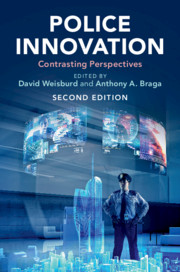Book contents
- Police Innovation
- Police Innovation
- Copyright page
- Contents
- Figures
- Tables
- Notes on Contributors
- Introduction
- Part I Community Policing
- Part II Procedural Justice Policing
- Part III Broken Windows Policing
- Part IV Problem–Oriented Policing
- Part V Pulling Levers (Focused Deterrence) Policing
- 9 Advocate
- 10 Critic
- Part VI Third–Party Policing
- Part VII Hot Spots Policing
- Part VIII Predictive Policing
- Part IX CompStat
- Part X Evidence-Based/ Risk-Focused Policing
- Part XI Technology Policing
- Index
- References
9 - Advocate
Policing and the Lessons of Focused Deterrence
from Part V - Pulling Levers (Focused Deterrence) Policing
Published online by Cambridge University Press: 09 August 2019
- Police Innovation
- Police Innovation
- Copyright page
- Contents
- Figures
- Tables
- Notes on Contributors
- Introduction
- Part I Community Policing
- Part II Procedural Justice Policing
- Part III Broken Windows Policing
- Part IV Problem–Oriented Policing
- Part V Pulling Levers (Focused Deterrence) Policing
- 9 Advocate
- 10 Critic
- Part VI Third–Party Policing
- Part VII Hot Spots Policing
- Part VIII Predictive Policing
- Part IX CompStat
- Part X Evidence-Based/ Risk-Focused Policing
- Part XI Technology Policing
- Index
- References
Summary
Pity the poor soul who, more than twenty years ago, would have predicted that hard-core street cops would be sitting down with serious violent offenders, telling them politely to cease and desist, asking them what they and their families need, and going to extreme lengths to keep them safe and out of jail. Exactly that has in fact become standard practice with police officers nationally; beyond that, and not coincidentally, that standard practice is increasingly understood to work very well indeed. The “focused deterrence” strategies piloted in Boston in the mid-1990s and implemented since then in a range of other jurisdictions are racking up impressive results in preventing violent crime and have become essentially mainstream. What was once seen as at best innovative – but more often to be fringe bordering on the bizarre, as in the face-to-face meetings between authorities and offenders that the Boston strategy invented – is now standard practice and routine not just for special interventions but as a philosophy of policing: it is, one hears police chiefs say, “what we do.”
- Type
- Chapter
- Information
- Police InnovationContrasting Perspectives, pp. 205 - 226Publisher: Cambridge University PressPrint publication year: 2019
References
- 10
- Cited by

